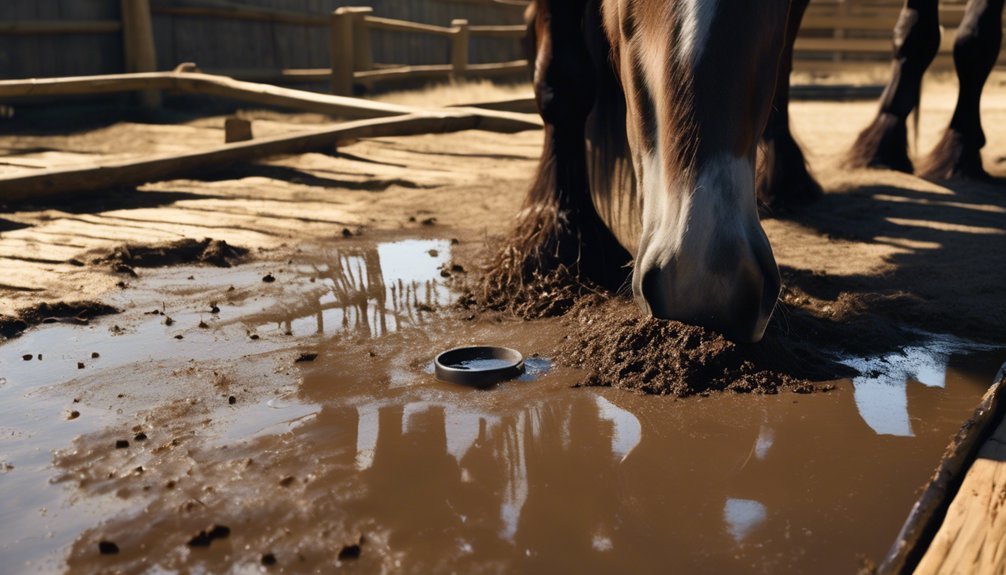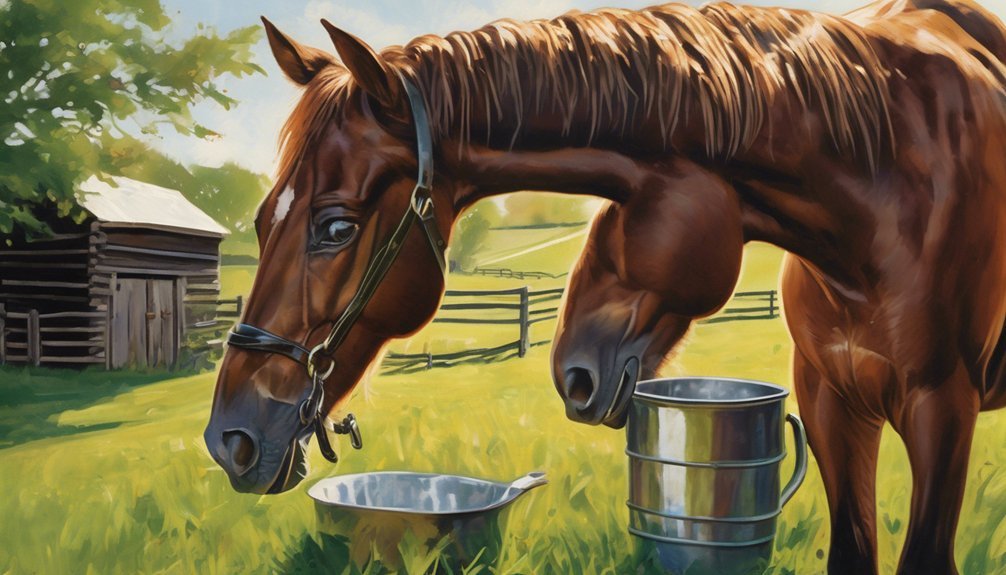
Feeding molasses to horses can enhance palatability and provide quick energy, yet its high sugar content raises concerns about insulin resistance and digestive health. While it may appeal to picky eaters and support weight maintenance, the balance between benefits and risks isn't always clear-cut. Understanding how to safely incorporate molasses into your horse's diet requires careful consideration of its nutritional profile and potential health implications. What should you weigh before adding this sweetener?
Key Takeaways
- Molasses enhances feed palatability, encouraging picky eaters to consume their diet, especially after illness.
- It provides quick energy through its carbohydrate content, beneficial for active or high-performance horses.
- The syrup contains trace minerals like calcium and potassium, contributing to overall equine health.
- High sugar content poses risks such as insulin resistance and digestive issues if consumed excessively.
- Alternatives like beet pulp or rice bran can offer similar benefits without the high sugar risks.
What Is Molasses and How Is It Made?

Molasses, a thick, sweet syrup, is a byproduct of sugar production derived from various plants, primarily sugarcane and sugar beets.
You might wonder how this rich syrup comes to be. During sugar extraction, the plants undergo crushing and boiling, which separates the juice from the fibrous material. This juice is then concentrated through evaporation to create molasses.
The sugar content in molasses varies depending on the production methods used; for instance, lighter molasses has higher sugar levels compared to darker varieties.
Understanding these nuances can help you appreciate molasses's role in equine diets. Its unique flavor and nutrient profile can enhance your horse's feed, but knowing its origin and composition is key to making informed dietary choices.
Nutritional Benefits of Molasses for Horses
When considering the role of molasses in equine diets, its nutritional benefits become quite clear.
Molasses is rich in carbohydrates, providing a quick energy source that supports your horse's performance. Its high sugar content aids in nutrient absorption, helping your horse efficiently utilize vitamins and minerals from other feed components.
Additionally, molasses can improve digestive health by promoting a balanced gut environment, which is essential for optimal nutrient breakdown. The presence of trace minerals like calcium and potassium further enhances its value, supporting overall well-being.
Enhancing Palatability: How Molasses Can Improve Feed Intake

While many factors influence a horse's willingness to eat, adding molasses to their feed can significantly enhance its palatability.
This flavor enhancement is particularly beneficial for picky eaters or those recovering from illness, as it encourages feed acceptance. The sweetness of molasses can mask unappealing flavors in supplements or lower-quality feeds, making them more attractive to your horse.
Research shows that horses are more likely to consume a diet that includes molasses, leading to better overall health and weight maintenance.
Additionally, by improving feed intake, molasses can help ensure your horse gets the essential nutrients they need.
Energy Source: The Role of Molasses in Equine Diets
As an excellent source of quick energy, molasses plays a vital role in equine diets, particularly for horses engaged in intense physical activity or those needing to gain weight.
By enhancing energy metabolism, molasses helps maintain dietary balance, ensuring your horse has the fuel it needs for optimal performance and recovery.
Consider these benefits of incorporating molasses:
- Provides rapid energy for high-intensity training
- Supports weight gain in underweight horses
- Enhances feed palatability, encouraging intake
- Aids in maintaining consistent energy levels during exercise
When used judiciously, molasses can be a valuable addition to your horse's diet, helping to meet their energy demands while promoting overall health and wellbeing.
Potential Health Risks Associated With Molasses

Although molasses can boost energy levels in horses, it's essential to be aware of the potential health risks associated with its inclusion in their diets.
One major concern is insulin resistance, especially in horses predisposed to metabolic disorders. The high sugar content in molasses can lead to elevated insulin levels, affecting your horse's overall health.
Additionally, excessive molasses can cause digestive issues, such as colic or diarrhea. Horses may struggle to process the sugars effectively, disrupting their gut flora.
To ensure your horse thrives, monitor their molasses intake closely and consider balancing it with fiber-rich feeds. Being proactive about these risks will help you maintain your horse's well-being and longevity.
The Impact of Sugar on Horse Health
Understanding the impact of sugar on horse health is vital, especially when considering the potential risks associated with feeding molasses. Excess sugar can disrupt sugar metabolism, leading to complications like insulin resistance. This condition can severely affect your horse's overall health and performance.
Here are some key points to consider:
- High sugar levels can lead to obesity and laminitis.
- Insulin resistance may develop, making it harder for your horse to regulate blood sugar.
- Sugar can increase energy spikes, causing behavioral issues.
- Digestive disturbances may arise from sudden sugar intake.
Molasses and Weight Management in Horses

When considering molasses in your horse's diet, it's crucial to evaluate its role in weight management. While molasses offers energy, its high sugar content can complicate weight control, particularly for horses prone to obesity or metabolic issues.
You'll want to implement feeding strategies that carefully balance molasses with fiber-rich feeds to mitigate weight gain. Incorporating molasses as a palatable additive can encourage your horse to consume necessary nutrients, but moderation is key.
Monitoring your horse's body condition score regularly will help you assess the impact of molasses on their weight. By being strategic in your approach, you can enjoy the benefits of molasses while keeping your horse's weight in check.
Alternatives to Molasses in Horse Diets
As you explore alternatives to molasses in your horse's diet, consider options that maintain palatability while supporting overall health.
Focusing on nutrient-rich ingredients can enhance your horse's well-being without the downsides of molasses. Here are some effective substitutes:
- Beet pulp: A great fiber source, promoting digestive health.
- Rice bran: High in fat and energy, excellent for weight gain.
- Oats alternatives: Consider barley or quinoa for balanced carbohydrates.
- Oil supplements: Such as flaxseed oil, boosting omega fatty acids.
Always prioritize hay quality and forage options to ensure a balanced diet, while considering grain substitutes and vitamin sources to fill nutritional gaps.
These alternatives can provide the taste and health benefits your horse deserves.
How to Safely Incorporate Molasses Into Your Horse's Diet

Incorporating molasses into your horse's diet can be beneficial if done thoughtfully and in moderation. Begin by following feeding guidelines and dosage recommendations to avoid potential health issues. A general rule is to limit molasses to about 1 cup per day for an average horse, but consult your vet for personalized advice.
| Horse Weight (lbs) | Daily Molasses (cups) | Notes |
|---|---|---|
| 800 | 0.5 | Suitable for light work |
| 1,000 | 1.0 | Ideal for maintenance |
| 1,200 | 1.5 | Good for performance horses |
| 1,400 | 2.0 | Consider energy needs |
| 1,600 | 2.5 | Monitor for sugar intake |
Recommendations for Feeding Molasses to Horses
While molasses can be a tasty addition to your horse's diet, it's important to follow specific recommendations to ensure their health and well-being.
Adhering to feeding guidelines will help you make the best choices for your horse. Here are some tips to consider:
- Choose the right molasses types, such as cane or beet, based on your horse's needs.
- Limit the intake to no more than 0.5 to 1 cup per day to avoid excess sugar.
- Monitor your horse's weight and adjust accordingly, especially if they're prone to metabolic issues.
- Introduce molasses gradually to prevent digestive upset.
Frequently Asked Questions
Can Molasses Help With a Horse's Hydration Needs?
Yes, molasses can provide hydration benefits due to its high sugar content, which encourages water intake. However, balance is key; too much can lead to health issues. Always consider your horse's overall diet and hydration needs.
Is Molasses Safe for All Horse Breeds?
Like a sweet serenade, molasses can delight many horses, but it's essential to consider breed differences. While some may thrive on its benefits, others might face challenges, so always tailor their diet to individual needs.
How Does Molasses Affect a Horse's Behavior?
Molasses can lead to behavior changes in horses, especially if they're sugar sensitive. The sugars may cause hyperactivity or anxiety in some, so it's vital you monitor their reactions and adjust their intake accordingly.
Can Molasses Replace Other Feed Additives?
Sure, let's just swap molasses for everything—who needs variety, right? While molasses has benefits, it shouldn't outright replace other feed alternatives. Balance is key for your horse's health and nutritional needs.
What Are the Signs of Molasses Intolerance in Horses?
If your horse has molasses allergies, watch for signs like digestive issues, including bloating, diarrhea, or colic. These symptoms indicate a potential intolerance, so it's crucial to consult your vet promptly for guidance.
Conclusion
In the grand scheme of horse nutrition, you might think that adding molasses is a foolproof solution for picky eaters and energy needs. Ironically, while it sweetens the deal, it can also lead to some bitter consequences, like insulin resistance and digestive issues. So, as you sprinkle molasses into your horse's diet, remember that moderation is key. Balancing its benefits with potential risks will help you keep your horse healthy and happy—after all, too much of a good thing can be quite bad.





